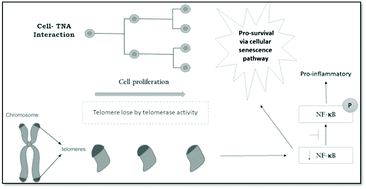Genome-nanosurface interaction of titania nanotube arrays: evaluation of telomere, telomerase and NF-κB activities on an epithelial cell model
Abstract
Titanium dioxide nanotube arrays (TNAs) provide a promising platform for medical implants and nanomedicine applications. The present cell–TNA study has provided profound understanding on protection of genome integrity via telomere, telomerase and NF-κB activities using an epithelial cell model. It has been revealed in this study that cell–TNA interaction triggers the telomere shortening activity and inhibition of telomerase activity at the mRNA and protein level. The present work supported that the cell–TNA stimulus might involve controlled transcription and proliferative activities via NBN and TERF21P mechanisms. Moreover, inhibition of NF-κB may promote molecular sensitivity via senescence-associated secretory phenotype activities and might result in reduced inflammatory response which would be good for cell and nanosurface adaptation activities. Thus, this nanomaterial-molecular knowledge is beneficial for further nanomaterial characterization and advanced medical application.



 Please wait while we load your content...
Please wait while we load your content...